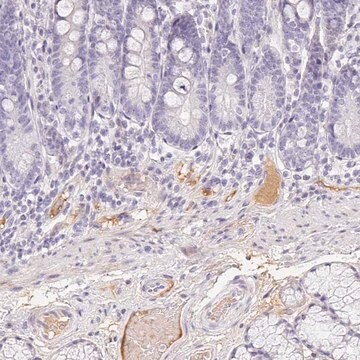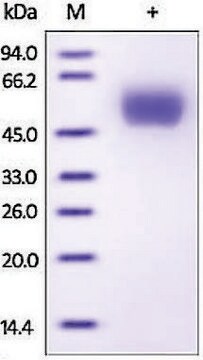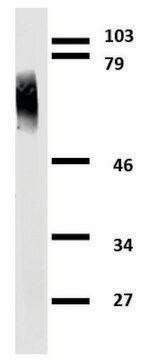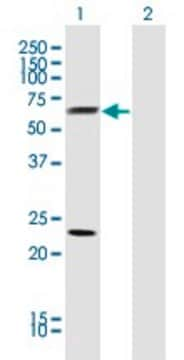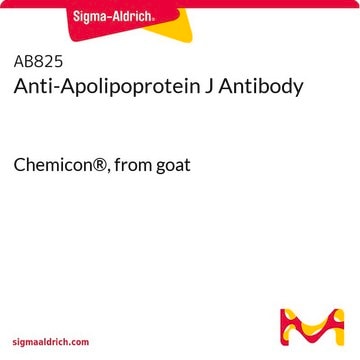推荐产品
生物源
rabbit
品質等級
共軛
unconjugated
抗體表格
affinity isolated antibody
抗體產品種類
primary antibodies
無性繁殖
polyclonal
形狀
buffered aqueous solution
物種活性
human, mouse
技術
immunofluorescence: suitable
immunohistochemistry: suitable
indirect ELISA: suitable
western blot: suitable
NCBI登錄號
UniProt登錄號
運輸包裝
dry ice
儲存溫度
−20°C
目標翻譯後修改
unmodified
基因資訊
human ... CLU(1191)
一般說明
The Clusterin (CLU) gene is mapped to human chromosome 8p21.1. The encoded protein is a chaperone and is conserved along with evolution. It is present in human tissues and fluids.
免疫原
Clusterin antibody was raised recombinant human Clusterin isoform 1.
應用
Anti-Clusterin antibody produced in rabbit has been used in immunohistochemical (IHC) staining (1:1,000 & 1:100).
生化/生理作用
Clusterin (CLU) is a multifunctional plasma protein and a fluid-phase complement inhibitor. It mediates the complement terminal pathway. Clusterin is an ATP-independent small heat shock protein-like chaperone. It functions as a redox sensor and a lipid transporter. Clusterin is associated with many age-related diseases such as neurodegeneration and metabolic syndrome. It is involved in cancer progression, promotion, metastasis, and chemoresistance. Increased serum CLU levels are observed in type 2 diabetes (T2D). It is known to suppress proteotoxicity. Clusterin might show anti or proapoptotic activities. This protein is associated with different functions of the brain. A single nucleotide polymorphism (SNP) in the CLU gene might cause the development of late-onset Alzheimer′s disease (LOAD).
特點和優勢
Evaluate our antibodies with complete peace of mind. If the antibody does not perform in your application, we will issue a full credit or replacement antibody. Learn more.
外觀
Supplied in PBS with 0.02% sodium azide.
免責聲明
Unless otherwise stated in our catalog or other company documentation accompanying the product(s), our products are intended for research use only and are not to be used for any other purpose, which includes but is not limited to, unauthorized commercial uses, in vitro diagnostic uses, ex vivo or in vivo therapeutic uses or any type of consumption or application to humans or animals.
未找到合适的产品?
试试我们的产品选型工具.
儲存類別代碼
10 - Combustible liquids
水污染物質分類(WGK)
WGK 2
閃點(°F)
Not applicable
閃點(°C)
Not applicable
Prakash Priyadarshi Praharaj et al.
Biochimica et biophysica acta. Reviews on cancer, 1875(2), 188500-188500 (2021-01-02)
Clusterin (CLU) is an evolutionary conserved molecular chaperone present in different human tissues and fluids and established to be a significant cancer regulator. It controls several cancer-associated cellular events, including cancer cell proliferation, stemness, survival, metastasis, epithelial-mesenchymal transition, therapy resistance
Katina M Athanas et al.
Schizophrenia research, 169(1-3), 381-385 (2015-10-21)
The expression of the gene that encodes clusterin, a glycoprotein that has been implicated in the regulation of many cellular processes, has previously been found in gene expression profiling studies to be among the most significantly differentially expressed genes in
Ahmed A Moustafa et al.
Reviews in the neurosciences, 29(1), 21-38 (2017-09-28)
In this review, we discuss the genetic etiologies of Alzheimer's disease (AD). Furthermore, we review genetic links to protein signaling pathways as novel pharmacological targets to treat AD. Moreover, we also discuss the clumps of AD-m ediated genes according to
Sarah M Carpanini et al.
Genes, 12(3) (2021-04-04)
Late-onset Alzheimer's disease (LOAD), the most common cause of dementia, and a huge global health challenge, is a neurodegenerative disease of uncertain aetiology. To deliver effective diagnostics and therapeutics, understanding the molecular basis of the disease is essential. Contemporary large
Vladimir J Balcar et al.
Neurochemical research, 46(2), 411-422 (2020-11-19)
Clusterin (CLU; also known as apolipoprotein J, ApoJ) is a protein of inconstant structure known to be involved in diverse processes inside and outside of brain cells. CLU can act as a protein chaperon or protein solubilizer, lipid transporter as
我们的科学家团队拥有各种研究领域经验,包括生命科学、材料科学、化学合成、色谱、分析及许多其他领域.
联系技术服务部门

